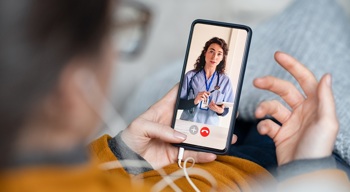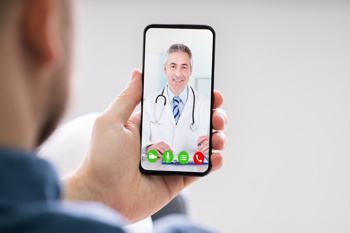
Video consultation software
Video consultation has other names it can be referred to as, such as video conferencing and telehealth, but the reality is the same for all of them: they are a video consulting platform and a way for doctors, nurses and other healthcare professionals to engage, via a video call, with a patient.
The purpose of engaging via a video consultation platform is a combination of time saving (commute), cost saving (transport fees), and to protect the health of both patient and clinician – especially in the face of Covid-19 but also in annual periods like Flu Season or if a patient is vulnerable to illnesses.
The process also works well internally for professional conferencing between clinicians who may be in different parts of the same hospital, or more likely in different parts of the region or even country. A video consultation app bridges the gap and allows these connections to happen, which improves care via communication, education, and relationship building.
There’s no one specific GP video consultation app, but there are a range of solutions providers with GP video consultation software included, available to be used by GP practices. This applies to online video consultation software in general too.
Now we begin our search for the best online consultation app, starting with some NHS video consultation software…
NHS app video consultation
Video Consultation Appointments (VCA) are typically performed via third party apps because there is no bespoke NHS video consultation app, however the NHS does partner with both eConsult (form based) and Engage Health (form and video). These can be accessed through the NHS app, as stated on the NHS Digital website.
Engage Consult
The Engage Consult app is a healthcare solution that connects patients with their doctor. The online app is for non-emergency use and is more related to the NHS goal of increasing patient engagement – a subject we at Access have talked about extensively.
The NHS Engage Consult collaboration with the NHS means that NHS Digital have assessed and approved Engage Consult as being at or better than the standards required for security, privacy, and functionality.
Pros: Two-way doctor to patient video consultation, online support resources, and 24/7 access to Total Triage; to help patients identify and assess their condition before speaking to a GP or nurse.
Cons: Apps like this with so many resources risk stressing a patient out through volume of information. ‘Cyberchondria’ is a phenomenon where patients often misread their symptoms online; presuming a far worse condition and exacerbating matters with acute stress.
PATCHS app
PATCHS is a digital health platform from Patchs Health, built with support from the University of Manchester and data specialists Spectra. Sometimes you will see reference to PATCHS NHS or Patches GP and spelling aside, it refers to the same patient portal application.
What is PATCHS NHS?
The Patchs GP app is a software solution utilised by the National Health Service, similarly to Engage Consult, to help GP surgeries and their patients connect. It offers a combination of two-way messaging and video consultation to better balance less urgent clinical requests around the most needy patients who will require in-person appointments.
Pros: Video consultation, two-way text messaging, automation of non-medical requests to non-medical administrators, and a reduction in waiting times and telephone queries.
Cons: The video consultation element is less of a priority for a GP practice with this solution. Rather it’s the combination of the chat, video, and the automation of admin that makes it a popular pick.

Patient Access
Patient Access is a popular patient portal application that is used by GP surgeries and pharmacies to manage patient inquiries, medical notes, and calendars for appointments. Such solutions are designed to empower patients to be more engaged with their own care.
Developed by Emis Health, Patient Access video consultation is just one of the many functions of the patient software given the competitive nature of the patient portal market and the need to present multipurpose solutions to healthcare providers with limited budgets available to them and a need for utility.
Pros: Video consultation can be performed with a doctor, nurse, or pharmacist in some cases. The appointment will be logged in the app’s calendar (which can be shared with Google), and you can join the calls on a computer, tablet, or smartphone.
Cons: It’s unclear how much support the video functionality has beyond the Google Chrome and Mozilla Firefox browsers, and whether the mobile app handles the video or redirects the user – something that could be complicated or limiting on an older device.
SystmOne
The SystmOne video consultation is done via their AIRMID application. This is a patient portal solution that allows users to arrange appointments, check medical history, and begin dialogue with a doctor. The app supports both video consultation and direct messaging and allows sign-in via SystmOne username or NHS Login.
Pros: A text or email is sent to invite/alert patients to their consultation in advance, and again when the clinician is ready to see them. That alert has a link which then can open up in the browser, but they can also join the call in the AIRMID app. For the GP, the effort to set up the video appointment is quick and easy.
SystmOne has a Client Integration interface to enable API connection with third party programs.
Cons: The GP side of the program is cluttered and looks old, compared to the clean and minimalist user app. There’s also a passcode required for entering the video appointment, which slows things down for the patient (especially given only they would know to turn up for it).
Babylon Health
Babylon Health is a care technology company operating in the US, UK and Rwanda primarily. Their care technology is used as an aid for delivering healthcare, with their software solution utilising AI to help with processing patients. Their pitch is that by analysing patient data they can begin the process of assessment and diagnosis, speeding things up for clinicians and patients.
Pros: Babylon video consultations are a big part of the Babylon Health app, meaning a lot of effort has gone into the software and functionality.
Cons: Babylon health video consultation is primarily a private healthcare service, offering 24 hour availability for video appointments. As the NHS is the go-to for healthcare in the UK – and a partner of theirs – the same levels of availability are not for British patient without paying for the service.
MyGP
Our next online video consultation app is the MyGP app. Another patient portal application, MyGP offers a combination of booking and managing appointments online with access to your medical records, prescription orders, and remote consultation (two way messages and video). The program even allows you to connect family members to you – especially beneficial for parents and their children.
Pros: Video appointments are simple to click and attend, and can be joined via the MyGP app or on a web browser (such as Chrome and Firefox).
MyGP also utilises your NHS Login to connect your GP with your primary care record.
The solution states that it uses APIs to connect with the NHS and other solutions, though frustratingly it’s a little vague and offers little more detail beyond this.
Cons: Patients cannot be sent a video appointment invite if they do not have the MyGP app on their phone – even if they plan on attending via a computer or laptop instead. Also, the remote consultation features are an additional module to purchase as part of the MyGP bundle.
Accurx
Accurx are an NHS approved digital supplier, boasting usage by over 98% of GP practices and almost 50% of NHS Trusts. They support primary, secondary and tertiary care as primarily a text messaging service, but within a solution that has expanded to video consultations, patient triage, remote monitoring, appointment management, and patient surveys.
Pros: Accurx is highly rated by the NHS and boasts a lot of case studies for its functionality and support as a multifunctional solution. The Accurx app can integrate with EPRs and other software tools via NHS standard APIs.
Cons: The video conferencing is reliable but its functionality isn’t as good as some of the rivals in terms of simplicity; both presentation and usage.
AireConsult
AireLogic’s AireConsult is the first of the solutions in this article to be a dedicated online and video consultation platform. Patients can do health checks against symptoms as an initial line of investigation, to help reduce the workload of GPs for minor ailments. Then there’s the opportunity for text or video consultation with a doctor or nurse.
Pros: A bespoke video consultation program designed for two-way communication, with clear and easy buttons and instructions. It also allows clinicians to use screen capture functions to capture evidence of patient conditions to be evidence towards diagnosis.
Cons: In the current world of tight funds, backing such a limited scope solution is potentially an inefficient way of spending.
AttendAnywhere
Off the back of the last solution, AttendAnywhere is another dedicated video consultation software. The AttendAnywhere platform is used by NHS England, NHS Scotland and NHS Wales.
Pros: The founders are specialists in telehealth, so remote solutions like this are its expertise.
The video calls have a waiting room, and they also guide users through an internet connection/speed test, as well as checking speaker and microphone functions before the call begins.
Cons: AttendAnywhere video consultations are web-based, rather than app based, meaning that patients have to use a browser (Chrome/Safari) on their PC, laptop, tablet or phone to host the video call. This isn’t the end of the world, but smartphones and tablets in particular have wildly differing qualities of video call – whether down to the camera or their processing speed.
DrDoctor
The DrDoctor app is a patient engagement platform. In layman’s terms it is a patient portal app, but it’s a popular solution and handles appointments, letters, assessments and – crucially for this article - it offers video consultation too.
Pros: More than 40 NHS Trusts are partnered with DrDoctor, which is a good indicator of quality. The clinic and waiting room display within the app are very easy to use and clear to read.
They have also recently joined the Access partner program, and now offer integration with our Rio solution.
Cons: Patient reviews suggest there may be issues with older devices and links not working.
Wellola
Wellola Portasana, their patient hub or patient portal, is a mobile and desktop app for accessing your care records and communicating with clinicians or your local GP surgery.
Pros: Wellola’s solution is approved by NHS Digital for the Digital First Online Consultation and Video Consultation (DFOCVC) framework in both categories.
The Portasana program is also modular, meaning you can choose which aspects – such as video consultation – you want for your organisation.
Cons: Wellola’s video tool seems a little bit light on functions compared to rivals from what little footage there is on the Wellola Youtube channel. It’s also unclear what devices and browsers it is supported by.
T-Pro eClinic Manager
T-Pro eClinic Manager is an online clinic and virtual consultation solution, enabling healthcare organisations to deliver more convenient virtual consultations to patients. There’s a display view of appointments, as well as panels for the video calls.
T-Pro has recently joined Wellola and DrDoctor in joining the Access partner program, establishing APIs to integrate with Access Rio EPR.
Pros: As well as offering a rounded telehealth package for acute and community care, eClinic has a dictation element which allows the clinician to dictate into a letter template. It can also handle secure emails and texts for appointments.
Cons: eClinic is still working on EPR integration, so in some cases manual upload of the appointments are needed. This may be why the T-Pro website is limited when discussing interoperability beyond their own software ecosystem.

This brings us to the conclusion part of the article. We have tried to be as objective as possible with our appraisal of solutions but as a solution provider ourselves it would be unfair to make picks for the best app for online consultation or the best app for doctors for online consultation.
Instead we’ll say that there are many good solutions listed above, with a variety of pros and cons. These providers will meet a broad range of criteria, so there should be something for everyone, but if you’ve read this far then why not consider The Access Group for your video consultation software…
Access x Microsoft Teams
Here at The Access Group we also offer video consultation in our Rio software solutions in the form of Microsoft Teams; state-of-the-art video conferencing that is now integrated in our programs.
This is a fantastic move for healthcare providers wanting to perform remote appointments as Microsoft Office 365 is already a staple for these organisations. Our inclusion of MS Teams means providers are just paying for the deployment and maintenance of integration, rather than a whole new video consultation platform.
Our Rio software also has a multitude of modules: EPR, a Mood Diary for mental health services, Mobilise for care notes on the go, and many more. All are interoperable with other solutions to ensure a smooth onboarding and little to no interruption of workflow, allowing healthcare providers to quickly elevate both their care quality and the conditions staff work in.

 AU & NZ
AU & NZ
 SG
SG
 MY
MY
 US
US
 IE
IE

